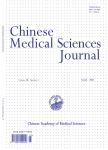EFFECTS OF RAPAMYCIN ON INTRACELLULAR CHOLESTEROL HOMEOSTASIS OF GLOMERULAR MESANGIAL CELL IN THE PRESENCE OF INTERLEUKIN-1β
EFFECTS OF RAPAMYCIN ON INTRACELLULAR CHOLESTEROL HOMEOSTASIS OF GLOMERULAR MESANGIAL CELL IN THE PRESENCE OF INTERLEUKIN-1β作者机构:Department of Nephrology Peking Union Medical College Hospital Chinese Academy of Medical Sciences & Peking Union Medical College Beijing 100730
出 版 物:《Chinese Medical Sciences Journal》 (中国医学科学杂志(英文版))
年 卷 期:2008年第23卷第4期
页 面:205-211页
核心收录:
学科分类:1001[医学-基础医学(可授医学、理学学位)] 10[医学]
主 题:rapamycin glomerular mesangial cell cholesterol low-density lipoprotein receptor ATP-binding ca, sette transporter A1
摘 要:Objective To investigate the effects of rapamycin on cholesterol homeostasis of glomerular mesangial cells and the underlying mechanisms. Methods Intracellular cholesterol accumulation was measured by Oil Red O staining and high performance liquid chromatography. The effects of rapamycin on interleukin-1β(1L-1β)-induced mRNA and protein changes of low-density lipoprotein receptor (LDLR) and ATP-binding cassette transporter Al (ABCAl) were assayed by quantitative real-time PCR and Western blot. Transient expressions of 3 types of mammalian target of rapamycin (mTOR), including mTOR-WT (wild type), mTOR-RR (rapamycin resistant, with kinase activity), and mTOR-RR-KD (rapamycin resistant, without kinase activity), were obtained by plasmid transfection. Results Rapamycin had no significant influence on intracellular cholesterol concentration trader normal condition, but it significantly decreased the intracellular cholesterol concentration in the presence of IL-1β. Rapamycin dose-dependently suppressed the increased expression of LDLR induced by IL-1β and up-regulated the suppressed expression of ABCAl caused by IL-1β Transient expression of 3 types of mTOR all reduced ABCAl mRNA expression significantly, which all could be overroded by rapamycin. Conclusions Rapamycin may contribute to the maintaining of glomerular mesangial cell intracellular cholesterol homeostasis under inflammatory state by both reducing cholesterol uptake and increasing cholesterol effiux. And the effect may be not completely mediiated by mTOR.



